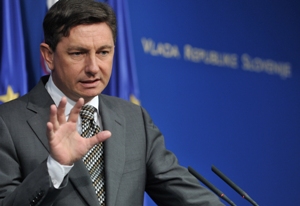NEWS
Prime Minister’s press conference
At today’s 66th regular session, the Slovenian Government, alongside other resolutions, adopted the draft stability programme, the draft Minimum Wage Act and the draft Act amending the Personal Income Tax Act. The Slovenian Prime Minister, Borut Pahor, and the responsible ministers first outlined the major resolutions, and Mr Pahor then answered a number of topical questions.
(Photo: Tamino Petelinšek/STA)
At today’s session, the Government of the Republic of Slovenia adopted the draft stability programme which defines economic policy measures for the period until 2013, since the Government’s key challenge in the following 4 years will be fiscal policy management which primarily ensures public finance consolidation. The stability programme thus presents fiscal consolidation measures to provide consistency between the mitigation of effects of the economic crisis, the functioning of the social state and public savings. Such strategy will contribute to the state deficit’s reduction below 3%.
The ministers today also adopted the draft Minimum Wage Act by which the amount of the minimum net wage has been raised to EUR 562. The stated amount is consistent with the minimum cost of living basket necessary to provide a decent living. The draft Act also provides for a transitional period for employers who would have major problems resulting from the entry into force of the new minimum wage, however, in order to be able to gradually introduce the minimum wage, the employer must obtain an approval from the workers’ representatives.
In connection with the Minimum Wage Act the Government today also adopted the draft Act amending the Personal Income Tax Act. Consequently, the raised minimum wage will result in the increase of labour costs, which cannot be completely shifted onto employers; for this reason a decision has been adopted according to which the State would take upon itself part of the burden by disburdening these incomes. The objective of the draft Act is to reduce personal income tax for persons who will receive their minimum wages under the provisions of the new Minimum Wage Act; in this way part of the burden of raising the minimum wage will also be taken by the State.
In this context, Prime Minister Pahor said that by adopting the draft Minimum Wage Act and the draft Act Amending the Personal Income Tax Act, the Government took into consideration the trade unions' demands and in particular the findings of the development report which shows that although hardworking, employees with the lowest income do not earn enough to make a decent living. "If the Government overlooked this fact, it would lead to a situation in which the conditions on the labour market would become worse in their basic sense, as work by itself would no longer be considered a value."
The Prime Minister went on to say that at its next session, the Government also plans to discuss the exit strategy document containing a set of short-term measures aimed at economic recovery, retaining existing jobs and creating new jobs, promoting a competitive business environment and increasing competitiveness of Slovenian economy in general. He added that attention should be paid to the maintenance of social stability in the society: "In the long term, social cohesion must be ensured through development policy and this year special attention will be devoted to this issue."
At today’s session the Government also adopted positions on the proposals submitted by trade unions and employers regarding the labour market development and assessed that these proposals serve as a basis for the preparation of amendments to the legislation in areas covered by the Social Agreement. The aim of the Government of the Republic of Slovenia is to coordinate the changes in the labour market with social partners, however, the Government must – if in a specific time period the social dialogue fails – take the responsibility and propose such changes it considers necessary for overcoming the crisis in the short-term.




